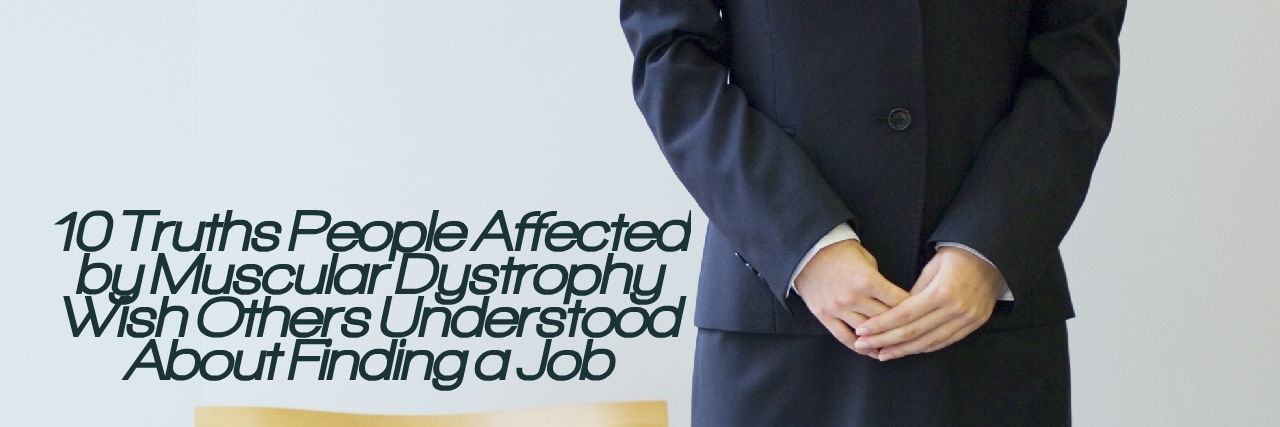10 Truths People Affected by Muscular Dystrophy Wish Others Understood About Finding a Job
Muscular dystrophy is a muscle debilitating disease that causes progressive weakness and degeneration of skeletal muscles used during voluntary movement. There are nine forms, and dozens of other neuromuscular diseases, including spinal muscular atrophy, ALS and related muscle-debilitating diseases. Each one of them is unique in their own way. Muscular dystrophies and related neuromuscular diseases can take away the ability to walk, talk, play and even breathe. It is unclear how many people are affected by muscular dystrophy, but it does not discriminate.
According to the National Organization on Disability, 20 percent of Americans with disabilities are employed while 69 percent of people without disabilities have a job. While muscular dystrophy certainly comes with its challenges, people with MD are more than capable of working and having an impact. Yet, people living with forms of muscular dystrophy often have difficulty joining the workforce.
We partnered with the Muscular Dystrophy Association to raise awareness about muscular dystrophy and the difficulty of finding work with a muscle-debilitating disease. We asked our muscular dystrophy community what they have gone through while trying to find work. Here’s what they had to say:
1. “I was blessed to have great supervisors and co-workers who were always willing to offer assistance when I was having a bad day fighting my Hyperkalemic Periodic Paralysis. However, even with the support, it was extremely embarrassing to have a supervisor help me walk or aid me in the bathroom.”
2. “I have two BA degrees, but because I have Congenital Muscular Dystrophy, this has limited me in what kind of jobs I can apply for and be qualified for. I graduated with my second BA degree in 2013; I have applied to many jobs over the years, but hardly ever called back for a job interview. Most people do not always understand, I get frustrated and it is tough at times job searching when you have a disability.”
3. “When your disability is physically obvious, you’re automatically at a disadvantage. The second the interviewer sees you, they see your disability and they instantly start judging and making assumptions about you and what they think you can’t do.”
4. “Finding a job while having MD has become almost impossible. Especially with this job market. The need for insurance outweighs almost everything else.”
5. “My son has a BS in engineering. He graduated two years ago. He has sent many resumes out and has had some interviews over the phone. Sorry to say nothing ever comes out of them. He really wants to work and be part of something and do good. He knows the obstacles that come along with his illness. He struggles with the fear of being honest and telling potential employers about his disability. He knows they will have to know but prolonging telling them gives him hope. The hope that maybe they will see him for the person he is and what he can do and not what he can’t.”
6. “My son is 20 years old and has Duchenne Muscular Dystrophy. He uses a wheelchair full time and can’t find work. I would just like for him to have the same opportunity as others.”
7. “I have IBM and was diagnosed in 2010. I was already employed at my job for over 24 years. There were things that I could no longer continue to do like lift boxes or climb a step stool. So my supervisor bullied and harassed me. People can be mean.”
8. “I have been refused work because I am in a wheelchair. I do not doubt that for a moment but they disguise it as another viable reason, that’s just how it works.”
9. “Looking for help puts me at risk. I have stopped looking for help because the help requires me to label myself as helpless.”
10. “I have been overqualified for jobs and when I walk in with forearm crutches or roll in with my wheelchair, I never get the job. A year and a foot reconstruction later I walked in and got the job. I didn’t take it because discrimination is real and happens every day.”
What do you wish others understood about what it’s like to look for work when you have a muscle-debilitating disease? Let us know in the comments.

